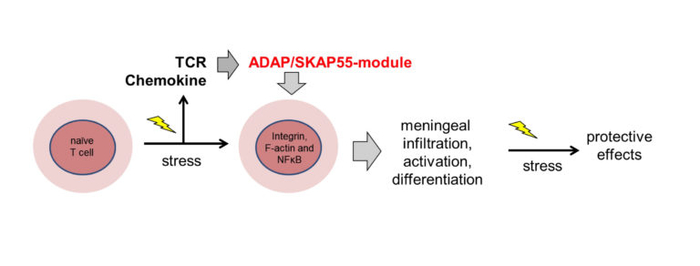Immune Cells in the Brain
It has long been thought that the brain under physiological conditions is not invaded by immune cells. Recent evidence now suggests that in the absence of any pathology T-cells actively migrate into the meningeal space and support cognitive information processing and memory formation. It is however not clear how this infiltration is controlled and how the elicitation of inflammatory responses is prevented.
We investigate the cellular mechanisms that control the infiltration of T-cells to the meninges and their effects on memory formation and stress responding. To shedd light onto the widely unexplored field how T-cells can support coping with traumatic stress, we make use of the cytosolic adapter protein ADAP which is critically involved in migration of T cells and other immune cells. Using different mouse models will allow us to specifically deplete ADAP in desired T cell subtypes and to investigate there role in responding to traumatic stress.

Working hypothesis. Schematic overview of ADAD/SKAP55-depend migration of T cells into the meningeal space and there activation upon the application of traumatic stress
Selected publications
Waldt N, Seifert A, Demiray YE, Devroe E, Turk BE, Reichardt P, Mix C,Reinhold A, Freund C, Müller AJ, Schraven B, Stork O, Kliche S. Filamin A Phosphorylation at Serine 2152 by the Serine/Threonine Kinase Ndr2 Controls TCR-Induced LFA-1 Activation in T Cells. Front Immunol. 2018 9:2852
Funding
Collaborative Research Center 854, project B12: ADAPtive T cell migration to the stressed brain 
PIs: Prof. Dr. Christian Freund (FU Berlin), Dr. Stefanie Kliche (OVGU Magdeburg), Prof. Dr. Oliver Stork
Researchers: M.Sc. Charlie Mix (Magdeburg), M.Sc. Nirdosh Dadwal (Berlin)
